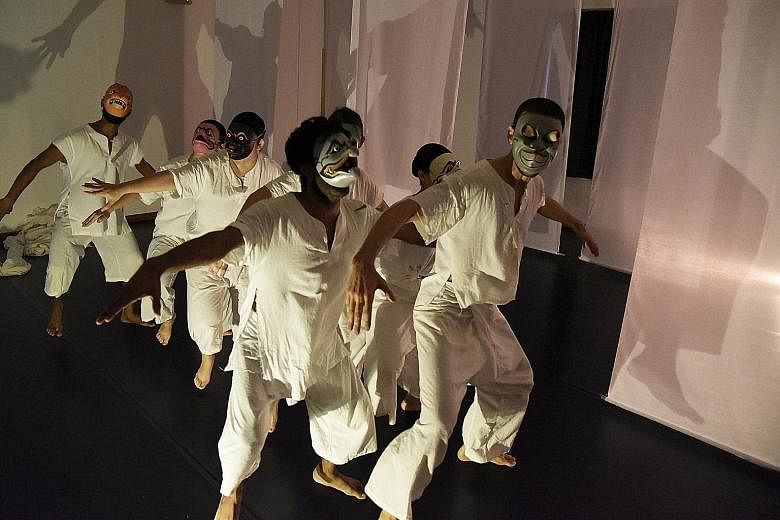Graduating students of the Intercultural Theatre Institute revisit their roots and play with traditions of throat-singing and Javanese theatrical dance in their second production this year.
Plaything Of The Gods runs at the Malay Heritage Centre from Thursday to Saturday. Loosely based on characters and stories from the Ramayana and Mahabharata, the work is directed by Indonesian director and dancer Bambang Besur Suryono and devised by seven students from Brazil, Hong Kong, India and Singapore.
With cast and director bringing elements of their heritage to the production, Plaything Of The Gods unites Indian poetry, Indonesian wayang wong (traditional theatre), as well as shadow-play. There is also Besur's mesmerising speciality: tribal, animalistic calls that resonate from within the entire body - not just the throat.
During a rehearsal at the institute at Emily Hill, Besur, 56, demonstrates the sonic technique he is teaching. Subterranean rumblings of sound emerge from deep within his chest, turn his body into a vibrating instrument and halt the student-actors' struggle with the draped fabrics meant for shadow play. He points to his chest: "This is important for the colour of the sound. I tell the students: 'We are already rich inside here, just open up and try.'"
Trained by famous choreographer Sardono W. Kusumo, Besur has been teaching at the institute since 2000. This is the first time that he is directing a graduation production.
-
BOOK IT / PLAYTHING OF THE GODS
-
WHERE: Malay Heritage Centre Auditorium, 85 Sultan Gate
WHEN: 8pm (Thursday and Friday), 3 and 8pm (Saturday)
ADMISSION: $25 from plaything.peatix.com
The institute's co-founder, T. Sasitharan, says this is because it is the right mix of students, who have the potential to benefit from devising a work with a master who straddles the traditional arts and contemporary dance and theatre.
In March, the class presented another devised work, Simplicity, under the aegis of Argentinian director Guillermo Angelelli, who made students explore the potential in the work of his compatriot, Jorge Luis Borges.
Sasitharan, 59, is also the dramaturg for Plaything Of The Gods. He says: "In Simplicity, we explored the place of poetry in the city. In Plaything Of The Gods, we're trying to explore the place of myth in the city, in contemporary living."
Besur describes the work as "meditative, like a mantra, like life, like the Bhagavad Gita". The Bhagavad Gita refers to an ancient poem considered part of the Mahabharata - though older than that epic - and a compendium of religious instructions for Hindus.
Using Indian epics was daunting for Singaporean student-actor Catherine Ho. The 35-year-old was more familiar with Broadway productions than Indian epics before she joined the institute.
"I was intimidated by this play in the beginning because it's two Indian epics I have no knowledge of," she says.
She chose, as her starting point, the character of Semar, important in the Javanese version of the Mahabharata. A clown-figure with tears in his eyes, Semar gives up his life so the hero-king Arjuna can bring peace to the world.
She finds that Chinese and Indian myths have similar ideas of balance. "In Indian culture, there's a creator and destroyer and it's about balance. In Chinese culture, there's a heaven and a hell and the king of hell is not a bad person - he maintains balance."
Characters such as Semar are new to Indian student-actor Soti Ramapati Dvivid, 27, who grew up reading the Ramayana and Mahabharata in Shahjahanpur. "Sometimes, I don't know what the Javanese version is trying to express," he says. "But it's nice to learn different traditional forms."
Brought up to revere the Ramayana and Mahabharata, he finds it fascinating to study them objectively as texts for drama.
"I know these texts from birth, but it's only since I moved to Singapore that I can stand back and work with these as drama scripts," he says.


